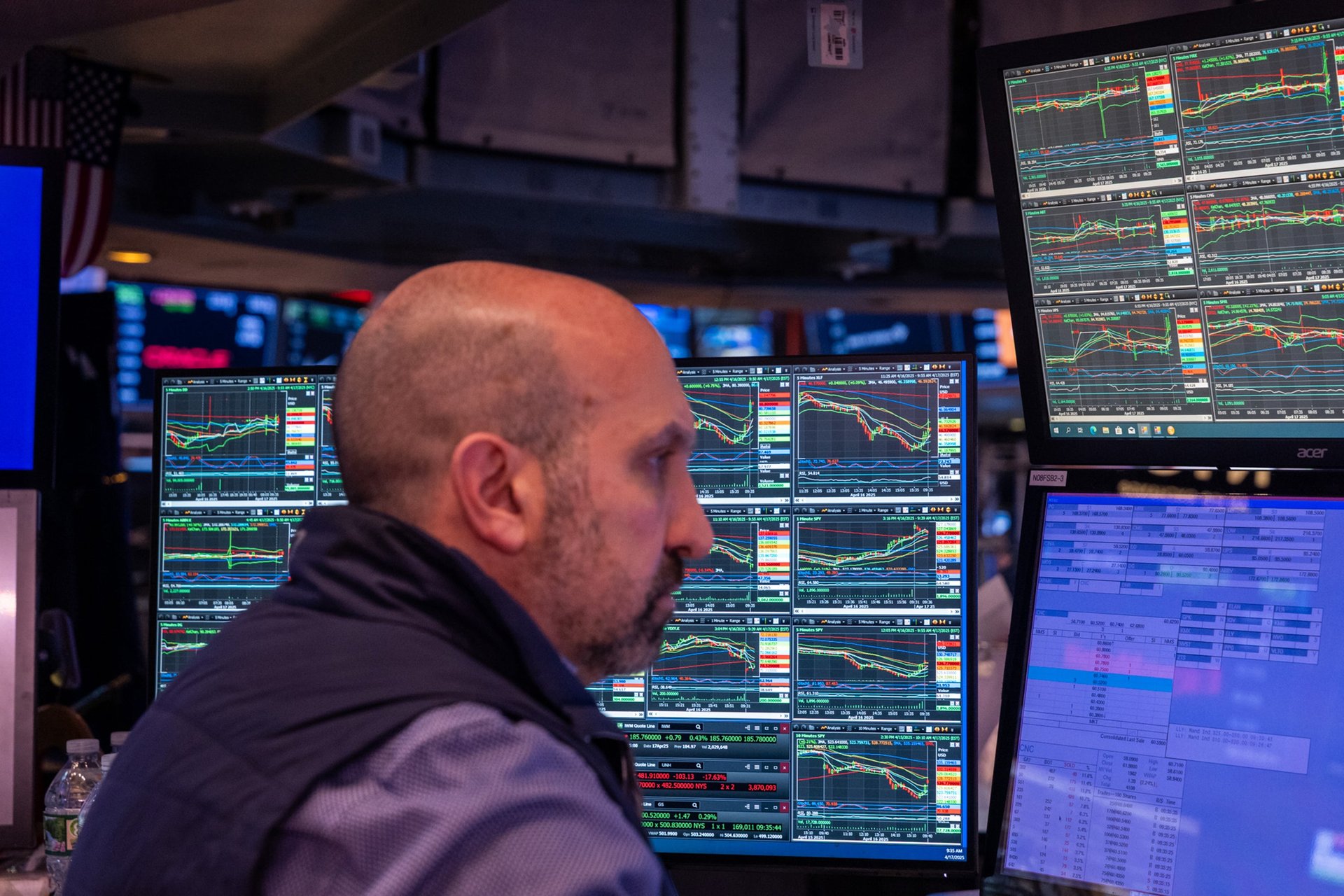The Dow plunges 1,000 points and the Nasdaq reels as Trump attacks Powell again
Tesla stock slides and markets go backwards as earnings season meets trade war chaos

U.S. stocks dropped sharply Monday, continuing a volatile stretch for Wall Street as geopolitical tensions, earnings anxiety, and Federal Reserve uncertainty continue to collide.
Suggested Reading
The tech-heavy Nasdaq led the losses, down 2.6% at the closing bell, with the S&P 500 off 2.4% and the Dow Jones Industrial Average falling 972 points, or 2.5%. The VIX jumped more than 12% as gold surged to a record $3,432 per ounce.
Related Content
Meanwhile, the U.S. dollar fell to a three-year low, and stocks fell further after President Donald Trump again fiercely criticized Fed Chair Jerome Powell, escalating his pressure campaign on the central bank to cut interest rates.
“‘Preemptive Cuts’ in Interest Rates are being called for by many,” Trump said on his social media site Truth Social. “With Energy Costs way down, food prices (including Biden’s egg disaster!) substantially lower, and most other ‘things’ trending down, there is virtually No Inflation. With these costs trending so nicely downward, just what I predicted they would do, there can almost be no inflation, but there can be a SLOWING of the economy unless Mr. Too Late, a major loser, lowers interest rates, NOW.”
Trump’s latest salvo against Powell came days after he said the central bank chief’s “termination cannot come fast enough.” The attacks have deepened investor fears over the Fed’s independence and added to the broader sense of policy unpredictability driving market volatility.
It’s no mystery: Long-term investors and operators alike know that trust and stability are core to functioning markets. When leadership injects chaos or undermines institutional credibility, the costs show up everywhere — from higher borrowing rates to delayed investment decisions.
Nvidia stock dropped 4.5% after new White House export restrictions on its AI chips appeared to hand a competitive edge to Chinese rivals such as Huawei, which reportedly plans to ship its own advanced chip to local customers as soon as next month. Tesla (TSLA) stock fell 6% ahead of Tuesday’s earnings as investors brace for lackluster results and look for any sign of stabilization in demand or margins.
With more than 100 companies reporting earnings this week — including Tesla, Google parent Alphabet (GOOGL), IBM (IBM), Boeing (BA), and Procter & Gamble (PG) — traders are looking for any signs of resilience, or at least clarity, as a chaotic second quarter kicks into gear.
Nvidia leads tech giants down
Nvidia (NVDA) stock was down after reports that Huawei will begin mass shipments of a new AI chip to Chinese customers as soon as next month. The move highlights Beijing’s push to reduce reliance on U.S. technology — and deepens investor anxiety around Nvidia’s access to the massive Chinese market after the White House imposed additional rules on the company’s chip sales.
It’s been a whiplash month for equities, with intraday swings as large as 5% and every major index well off its pre-“Liberation Day” levels. The coming week may determine whether that trend deepens... or finally breaks.
Earnings from tech giants, including Tesla and Google, will be scrutinized not just for growth but for signs of stability in a market that’s grown more erratic by the day. With so many companies reporting this week, the next few days could set the tone for the rest of the second quarter.
‘Deal progress’ comments don’t count
“The Street does not care anymore about words and ‘deal progress’ comments,” Wedbush analysts said in a Sunday note. “The economic damage done from this Trump back and forth tariff plan has likely pushed the economy towards a recession path already as cap ex [has been] halted across the board, hiring plans paused, price increase worries, and supply chain shock/chaos has sparked a level of uncertainty in the US not seen since Covid days.”
The difference, Wedbush noted, is that this time the damage is “self-inflicted,” concluding bluntly: “We are heading into a tech earnings season that we expect minimal/no guidance as C-level executives are playing darts blindfolded with gauging the growth and spending plans of their customers.”
One bright spot? Netflix (NFLX). In the first quarter of 2025, the company posted an almost-$3-billion profit on $10.54 billion in revenue — with an eye-popping 31.7% operating margin. Wall Street seems especially approving of Netflix’s ad-supported $7.99 monthly membership, which appears less vulnerable to recession-driven household savings measures.
Netflix stock rose 1.6% on Monday.